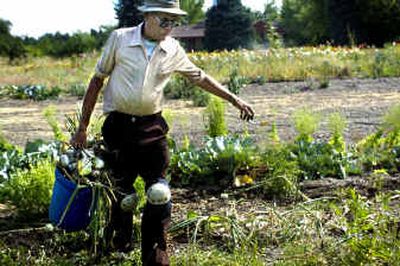Growing and thriving

When Bob Carnegie wasn’t home, customers used to walk behind his house and weigh out produce themselves. They’d fill gunny sacks with homegrown sweet corn or tomatoes and leave money behind in a jar.
These days, the 74-year-old Carnegie doesn’t grow produce for profit. Like many other longtime Spokane Valley gardeners he coaxes flowers, fruit and vegetables out of his rocky Spokane Valley soil to nourish his own body and soul.
“If I didn’t (garden) I’d probably sit in the house and die,” Carnegie said recently, sitting on a chair a stone’s throw from weed-free rows of tomato plants.
“You’ve got to have something to do,” Carnegie said.
In Spokane Valley, subdivisions have sliced up large suburban lots that used to produce bounties of melons and rows of fruit trees. Yet numerous senior citizens still weed and water large vegetable gardens, even as aches and pains make it increasingly difficult.
This year Carnegie planted 32 tomato varieties: beefsteak, roma, cherry and yellow. The seeds, when put side by side, look nearly identical. Yet they are now yielding fruits of different tastes, texture and colors.
“It comes in the minor miracle department,” he said.
Carnegie, a retired farm machinery mechanic, has leukemia. He’s had oral treatments and also been given infusions of “toxic, terrible stuff.” He knows the disease has weakened his body and left him vulnerable.
Yet he doesn’t intend to quit gardening.
Carnegie grew up on a dairy farm on Campbell Road in Greenacres and said he has gardening in his blood. In 1951, he moved his family to 2 6½ acres on 12th Avenue near Pines Road. While his garden has shrunk since the mid-1980s, it’s still immense.
Long rows of flowers line the front yard, including stunning dahlias. Out back are fruit trees and neat rows of well-irrigated vegetables. Sometimes, he has a hard time convincing his body to yank out weeds, but he keeps at it.
“If you get out here digging in the weeds, you just kind of forget you hurt all over,” Carnegie said.
As people age, they need to stay active and remain engaged in their community, said Nick Beamer, director of Aging and Long Term Care of Eastern Washington.
“These are important things for the health of older individuals. It’s been shown time and time again,” Beamer said.
Good health brings happiness which leads to improved quality of life, Beamer said. He said he takes his hats off to individuals for continuing to do physical work.
Chet Utecht grew up on a farm near Progress Road and 24th Avenue. He has 10 acres and, by his own admission, “not much common sense.”
Even though he’s had both radiation and chemotherapy to help him fight cancer, he has an acre of corn, half an acre of cucumbers, approximately 1,500 tomato plants, a patch of hay and pumpkins. Utecht says he enjoys the work, but has taken a more relaxed approach in recent years. If the work gets done, great, he says. If it doesn’t, “to hell with it.”
“I don’t know how much more I can do,” said Utecht, who will turn 80 this year. “It’s getting a little tougher all the time.”
Frank Dauenhauer, 91, said he still loves gardening, but the physical demands of weeding and picking make it hard, he said. He keeps a chair handy, in case he needs to rest.
When Frank and Thelma Dauenhauer bought their land in Greenacres in 1960, they had raspberry bushes as well as pears, apples, peaches and plums. They would pick themselves, preserve what they could and sell the rest.
The Dauenhauers still have an impressive garden. Thelma has a vibrant swatch of zinnias growing. One day this week, two hummingbirds flitted through the flowers, looking for nectar. There are rows of corn that will be harvested in upcoming weeks. He also grows cantaloupe, string beans, tomatoes, squash, cucumbers and other assorted vegetables.
A hand-lettered sign in front advertises beets for sale. While the produce is mostly for the family, if he has extra vegetables, he’ll sell them.
Frank Dauenhauer — a retired Kaiser machine operator with a gentle smile that creases his eyes — loves the social aspect of selling produce. He talks to anyone who happens by his house on Greenacres Road. Gardening gets him outside and keeps him from growing bored, he said.
Each year, the garden becomes physically more and more difficult for Dauenhauer.
He promised Thelma on Monday that this year would be his last. Next year, he’ll only plant “maybe a couple of tomatoes,” he said.
Thelma smiled, skeptical.
“He’s said the last 10 years he wouldn’t plant,” she said. “Bless his heart, he loves (gardening). But it’s getting pretty tough.”